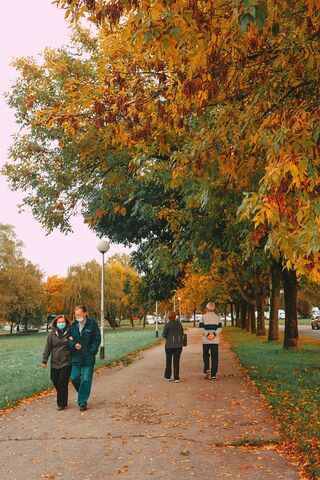Health
How Social Connections Improve Your Brain Health
A new study reveals social engagement increases gray matter in the brain
Posted October 26, 2020 Reviewed by Kaja Perina

Keeping your social calendar full improves your brain health, according to a new study. But these findings run in the face of social distancing during the pandemic. Older adults who get together with friends, volunteer, or attend classes especially have healthier brains, but these activities have been blunted due to the necessity of social distancing. The new findings, reported in the Journal of Gerontology: Psychological Sciences, suggest that "prescribing" socialization could benefit older adults in warding off dementia, much the way prescribing physical activity can help to prevent diabetes or heart disease. Although this study was conducted before Covid-19, the findings are relevant for all ages during the pandemic when many people suffer from social isolation. But how do we reconcile these contradictions?
The New Study
Dr. Cynthia Felix and her colleagues at the University of Pittsburgh Graduate School of Public Health’s Department of Epidemiology employed data from 293 community-dwelling participants (average age 83 years old) from the Health, Aging and Body Composition (Health ABC) study. Study participants also received a sensitive brain scan that measures the cellular integrity of brain cells used for social engagement. This study is the first to use a particularly sensitive type of brain imaging to conduct such an evaluation.
The participants provided detailed information about their social engagement, and the researchers scored the participants' information about social engagement, awarding high scores to people who played board games; went to movies; traveled long distances; attended classes, lectures or adult education events; participated in church or other community activities; convened with children, friends, relatives or neighbors at least once a week; or volunteered or worked.
The researchers found participants who reported greater levels of social engagement had more robust gray matter in regions of the brain relevant in dementia. Maintaining brain health is of critical importance. Once brain cells die, dementia typically follows. Social engagement with at least one other relative or friend activates specific brain regions needed to recognize familiar faces and emotions, make decisions and feel rewarded. The good news is that even moderate "doses" seem to be beneficial.
These findings have ramifications for older adults and all ages practicing Covid-19 isolation. "Our data were collected before the Covid-19 pandemic,” said lead author Felix, “but I believe our findings are particularly important right now, since a one-size-fits-all social isolation of all older adults may place them at risk for conditions such as dementia.”
Similar to how large public health studies assess the best programs to encourage physical activity to prevent chronic disease in older people, Felix believes her team's findings, coupled with previous research, provides justification for randomized control trials to assess the impact of specific types and amounts of social activities on brain health. "There is no cure for dementia, which has tremendous costs in terms of treatment and caregiving,” Felix explained. “Preventing dementia, therefore, has to be the focus. It's the 'use it or lose it' philosophy when it comes to the brain."
Offsetting Social Isolation To Create A Healthy Brain
The takeaway from this research is it’s important that all ages find safe and balanced ways to maintain social connections. The pandemic has pushed more than a quarter of the world’s population into lock down, and many are feeling cooped up and developing cabin fever or the “quarantine blues.” When life is uncertain, it’s natural to feel out of control, even to have depression from the losses and the important social events that are cancelled or postponed: graduation, funerals, weddings and birthday celebrations. Persistent feelings of sadness or loss of interest that characterize major depression can lead to a range of behavioral and physical symptoms. These may include changes in sleep, appetite, energy level, concentration, daily behavior or self-esteem. But there are steps you can take to offset quarantine’s mandate of self-distancing.
It’s important to start with making ourselves a priority with self-care. The trifecta of self-care is eating healthy, nutritious food, regular exercise and ample sleep. Make an appointment with yourself and schedule personal time. Bring your attention to the present moment once in a while, notice what’s around you and breathe. This is called mindful open awareness. You’ll be less stressed and more productive and successful in the long run. Meditation, prayer or contemplation can help you focus on what you’re grateful for and bring comfort during these extraordinary times.
It’s important to keep your social relationships alive, maximize social connections on social media and reach out to others. Stay in touch with friends and loved ones, and volunteer to help when and where you can. One family I know did a Zoom ‘Nailed It’ competition in which other family members and friends baked a cake using a template to see who could best approximate the original. Take time out to connect with family members and close friends you trust over social media and talk about your concerns and how you’re feeling.
To avoid social isolation fatigue, take breaks from watching, listening and reading about the pandemic. When you do catch up with news feeds, you can keep a balance by paying as much attention to the upbeat news wrapped around downbeat news. “Many people are going to catch Covid-19” becomes “Many people will contract the virus, and many people will get better, too.”
It’s important to focus on friends and neighbors in your own corner of the world to whom you can offer your help, as one person told me, “For now, we’re helping by staying home, staying sane, supporting local farms and vendors and growing stronger together.” Consider the personal resources at your fingertips, instead of the limitations. Remind yourself how your resources provide an opportunity to learn more about your strengths and positive qualities and put them into practice.
References
Felix, C. et al. (2020). Greater social engagement and greater gray matter microstructural integrity in brain regions relevant to dementia. The Journals of Gerontology: Series B. doi.org/10.1093/geronb/gbaa173
University of Pittsburgh. (2020, October 19). 'Use it or lose it': Regular social engagement linked to healthier brain microstructure in older adults. ScienceDaily. Retrieved from www.sciencedaily.com/releases/2020/10/201019082854.htm




